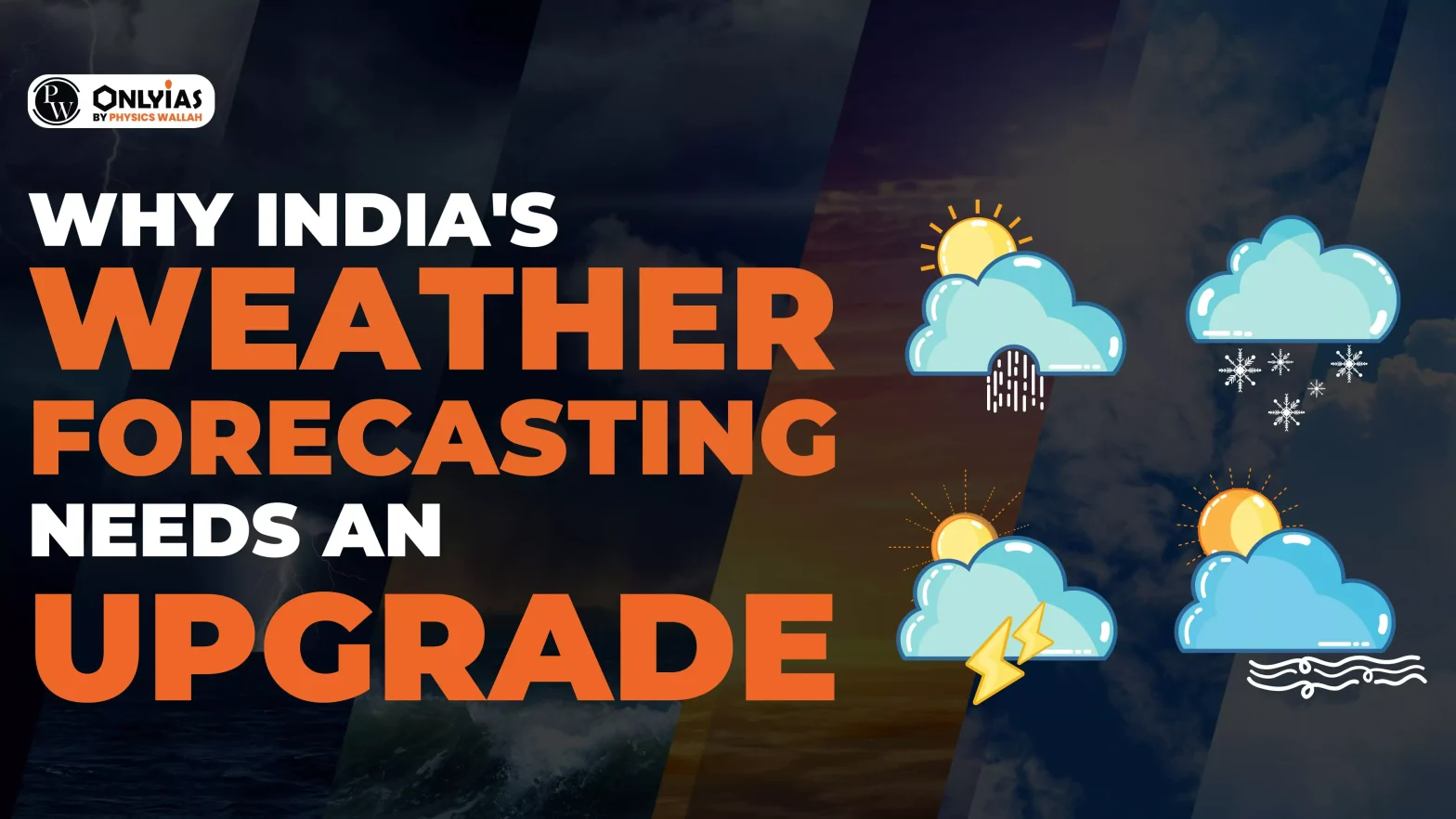India’s weather forecasting, traditionally focused on monsoons. It now faces increased demand for precision due to various reasons. While the IMD has improved accuracy, challenges in hyper-local predictions and forecasting rare events highlight the need for further infrastructure upgrades and tailored models.
Current State of Weather Forecasting
- Traditional Focus: India’s meteorological services primarily concentrated on monsoon forecasts, such as predicting whether it would be a strong or weak monsoon, along with basic temperature updates for major cities like Delhi, Chennai etc. Other aspects of weather forecasting received minimal attention.
- Perception Shift: Over the past decade, the perception of weather forecasting has significantly changed. The public now views it as crucial, driven by a growing awareness of the impact of weather on daily life and safety. People frequently check daily weather forecasts, especially when planning trips, indicating rising interest.
Enroll now for UPSC Online Course
Reasons for Increased Interest in Weather Forecasts
- IMD’s Progress: The India Meteorological Department (IMD) has made significant strides in improving forecast accuracy, which has increased public trust. Beyond monsoon forecasts, IMD now provides information on a range of weather events.
- Public Expectations: There is a growing public interest in obtaining detailed weather information, not just about the monsoon but also about daily and seasonal weather patterns.
- Extreme Weather Events: The frequency and intensity of extreme weather events, such as cyclones, floods, and heatwaves, have increased due to climate change. This has led to a heightened demand for accurate and timely weather predictions.
IMD’s Progress and Advances
- Enhanced Monitoring: The upgradation of weather forecasting infrastructure began in 2012 with initiatives like Project Mausam, aimed at improving long-range monsoon forecasts. Long-range monsoon forecasts are crucial for the Indian economy because they help in better planning for agriculture, which is a significant sector in India. Accurate forecasts enable farmers to make informed decisions about planting and harvesting, manage water resources efficiently, and mitigate the impact of potential weather-related disruptions.
- Improved Observation Networks: The introduction of sophisticated instruments like Doppler radars and enhanced monitoring capabilities.
- Advanced Computing: The use of upgraded computing power and simulation models that allow for more advanced calculations.
- Cyclone Predictions: Successful early warnings for cyclones, starting with Phailin in 2013, have saved lives and increased public trust in IMD forecasts. In contrast, the 1999 Super Cyclone in Orissa resulted in significant loss of life due to less accurate forecasting.
Check Out UPSC CSE Books From PW Store
Challenges in Current Forecasting
- Precision Issues: IMD can accurately forecast broad or long-term events such as monsoons and cyclones that cover large geographical areas. However, these forecasts lack the precision needed for hyper-local events.
- Local Challenges: For example, while IMD can predict rain in a city like Delhi, it cannot pinpoint which specific area within the city will be affected. Similarly, forecasting the intensity of the monsoon across different regions within a state like Uttar Pradesh is challenging.
- Challenges in Forecasting Rare and Extreme Weather Events: Predicting rare and extreme weather events, such as sudden cloudbursts or flash floods, is particularly difficult. These events are becoming more frequent due to climate change, often surpassing the capabilities of current forecasting models.
- Impact of Climate Change: The unpredictability induced by climate change has made weather forecasting more challenging and less reliable, especially for these extreme occurrences.
- Tropical Variability: Forecasting weather in the tropics is generally more challenging than in regions farther from the equator due to the greater variability in weather phenomena
- Local vs. Large-Scale Events:
- Ease of Large-Scale Predictions: Large-scale weather systems such as monsoons and cyclones are easier to forecast because of their widespread nature. Routine cyclic events also tend to be more predictable.
- Challenges with Localised Events: In contrast, localised events like cloudbursts or heatwaves are much harder to predict accurately. Predicting the monsoon season for the entire country is relatively easier, but providing precise regional, local, or monthly forecasts is more challenging and less reliable.
- Current Limitations:
-
- Grid Size: IMD currently provides forecasts for a 12 km x 12 km area, which is too large for specific city areas. Efforts are underway to develop forecasts for smaller grids (e.g., 3 km x 3 km) and eventually 1 km x 1 km areas. This would enable more precise predictions of hyper-local weather conditions and enhance early warning systems.
Future Objectives
- Infrastructure Upgrades: Further improvements are needed in ocean observation systems, high-resolution earth observation satellites, and enhanced coverage of Doppler radars, particularly in the eastern and northeastern regions.
- Customised Models: There is a need to develop India-specific weather models that can better simulate local conditions, as global models have limitations in addressing India’s unique climate challenges.
- Intense Research and Development: Continued research is crucial to address the challenges posed by climate change and improve forecasting accuracy.
Enroll now for UPSC Online Classes
Conclusion
The IMD’s planned upgrades aim to address these challenges by developing more precise and localised weather forecasting models. This upgrade is essential for improving public safety, planning, and response to extreme weather events, which are becoming more frequent due to climate change.
![]() 29 Aug 2024
29 Aug 2024
